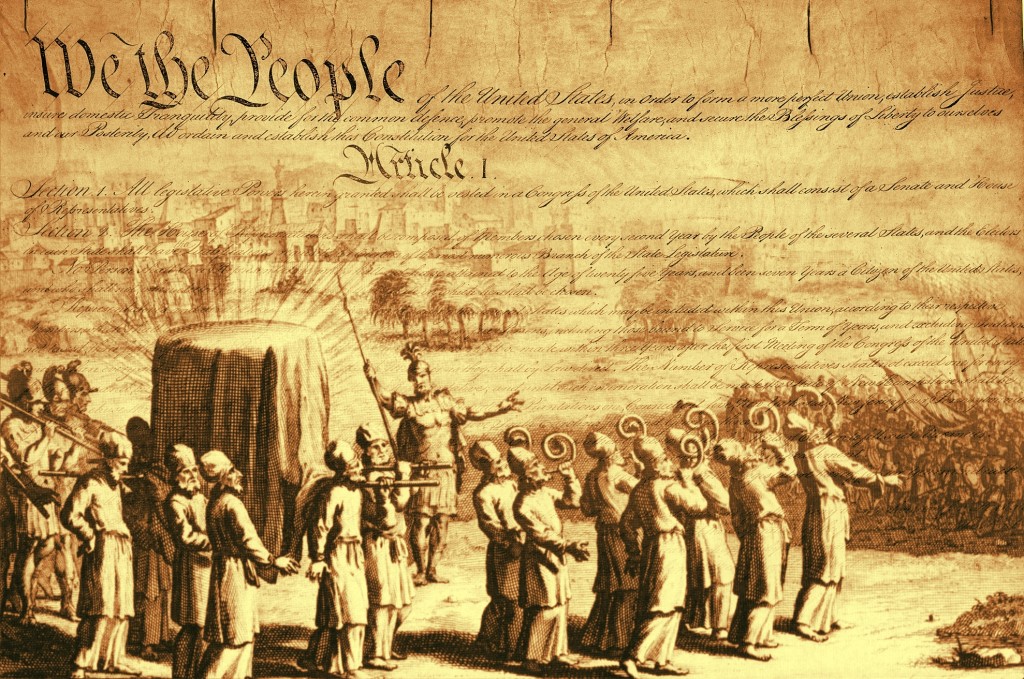Important!
Back in January 2014, I wrote this:
“We are told by political fundamentalists that even our America, born in the crucible of colonial tyranny long ago, must be forever held hostage by the ‘original intent’ of those powdery old white men who signed the U.S. Constitution (rumor has it, by the flickering light from a burning bush on Mount Sinai). It’s peculiar of course, but apparently only certain fundamentalists can rightly divine original intent…”
Yesterday, a Facebook friend posted a bit of a fascinating letter that the tea party and their faux intellectuals like David Barton will never tell you about. Enjoy.
– Monsieur d’Nalgar, Fourth of July, 2015 CE
Some men look at constitutions with sanctimonious reverence, and deem them like the arc of the covenant, too sacred to be touched. They ascribe to the men of the preceding age a wisdom more than human, and suppose what they did to be beyond amendment. I knew that age well; I belonged to it, and labored with it. It deserved well of its country. It was very like the present, but without the experience of the present; and forty years of experience in government is worth a century of book-reading; and this they would say themselves, were they to rise from the dead. I am certainly not an advocate for frequent and untried changes in laws and constitutions. I think moderate imperfections had better be borne with; because, when once known, we accommodate ourselves to them, and find practical means of correcting their ill effects. But I know also, that laws and institutions must go hand in hand with the progress of the human mind. As that becomes more developed, more enlightened, as new discoveries are made, new truths disclosed, and manners and opinions change with the change of circumstances, institutions must advance also, and keep pace with the times. We might as well require a man to wear still the coat which fitted him when a boy, as civilized society to remain ever under the regimen of their barbarous ancestors.
From a letter by Thomas Jefferson to Samuel Kercheval on June 12, 1816. http://teachingamericanhistory.org/library/document/letter-to-samuel-kercheval/
Even then, America’s political fundamentalists were an irksome lot, and Jefferson was reluctant to share such sentiments publicly. In 1824, when Kercheval asked to publish Jefferson’s views on amending the constitution, his request was politely refused:
Our fellow citizens think too independantly for themselves to yield their opinions to any one. Another strong reason against it at present is the alarm which has been excited, and with great effect, lest too much innovation should be attempted. These letters would do harm by increasing that alarm. … I should have no objection to a discreet communication of these letters to thinking and friendly members [of the legislature, assembled to consider a call for constitutional amendments], who would not hang me up as a scare-crow and enemy to a constitution on which many believe the good and happiness of their country depend. I believe on the contrary that they depend an amending that constitution from time to time and keeping it always in harmony with the advance of habits and principles. But I respect their right of free opinion too much to urge an uneasy pressure on them. Time and advancing science will ripen us all in it’s course, and reconcile all to wholsome and necessary changes.
From a letter by Thomas Jefferson to Samuel Kercheval on September 5, 1824. http://founders.archives.gov/documents/Jefferson/98-01-02-4514

